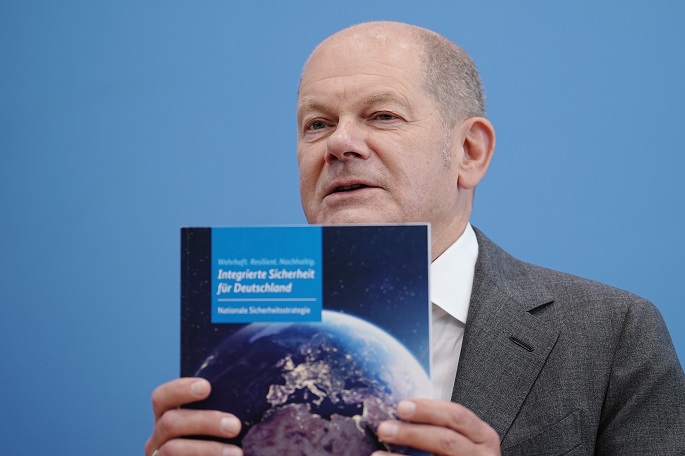Germany unveils 1st ever security strategy
Published : 14 Jun 2023, 23:19
The German government plans to respond to the challenges of an increasingly unstable world order with a "policy of integrated security" laid out on Wednesday in a new National Security Strategy, reported dpa.
The challenges of facing a more unstable world order, as seen by Russia's war against Ukraine, means Germany's security environment has changed and the country needs to respond, Chancellor Olaf Scholz said in presenting a new security plan on Wednesday.
Scholz presented the National Security Strategy, which had previously been adopted by the cabinet after months of deliberations, together with his foreign, interior, finance and defence ministers.
It is Berlin's first ever national security strategy, launched at a moment when the security environment is tense, with Russia’s war on Ukraine launched last year plus heightened geopolitical rivalry between China and the US.
"Despite all the changes, it remains the central task of the state to ensure the security of its citizens, without compromise," the chancellor said.
This is no longer confined to defence and the armed forces, or Bundeswehr, "but about the full range of our security," Scholz stressed.
The plan pointed to not only Russia, but also China, as threats to a global rules-based order.
"Today's Russia is the greatest threat to peace and security in the Euro-Atlantic area for the foreseeable future," the more than 70-page paper states.
While the paper acknowledged that "China is a partner, competitor and systemic rival," it also noted that "China is trying in various ways to reshape the existing rules-based international order, is increasingly aggressively claiming regional supremacy, and is repeatedly acting in contradiction to our interests and values."
Germany's National Security Strategy includes diplomacy as well policing, fire fighting, technical aid organizations, development cooperation, cyber security and the resilience of supply chains. "All these means and instruments must interlock and work together to strengthen our country's security," the chancellor said.
The plan includes national and alliance defence, protection of technical infrastructure, cyber and space security, raw material, energy and food security. Civil defence and civil protection, development policy, protection against foreign influence and espionage as well as dealing with climate crises and pandemics are also mentioned. The federal, state and local governments, business, science, civil society and citizens are to be involved.
In the plan, Germany reiterates its commitments to NATO and the European Union and pledges to strengthen the Bundeswehr by investing an average of 2% of economic output in defence over many years.
The strategy also vows to defend democracy. Further, German dependence on raw materials and energy is to be reduced by diversifying supply relationships.
During the plan's presentation, German officials said German arms exports would be affected, but they did not elaborate. They did say that the government wants to give more consideration to strategic issues in cooperation with partner states in a reorientation of armament policy. Basic guidelines for this would become clear in the National Security Strategy, said Defence Minister Boris Pistorius.
"Of course, in view of the new world situation, arms exports are also part of the strategic toolbox. That is quite clear," Pistorius said. "When we talk about strategic partnerships, it must also be about this issue, so also a new balance."
Scholz said further details of the plans would be made public at another time. He acknowledged that there "remain strict arms control regulations," but said strategic issues need to be taken into consideration.


